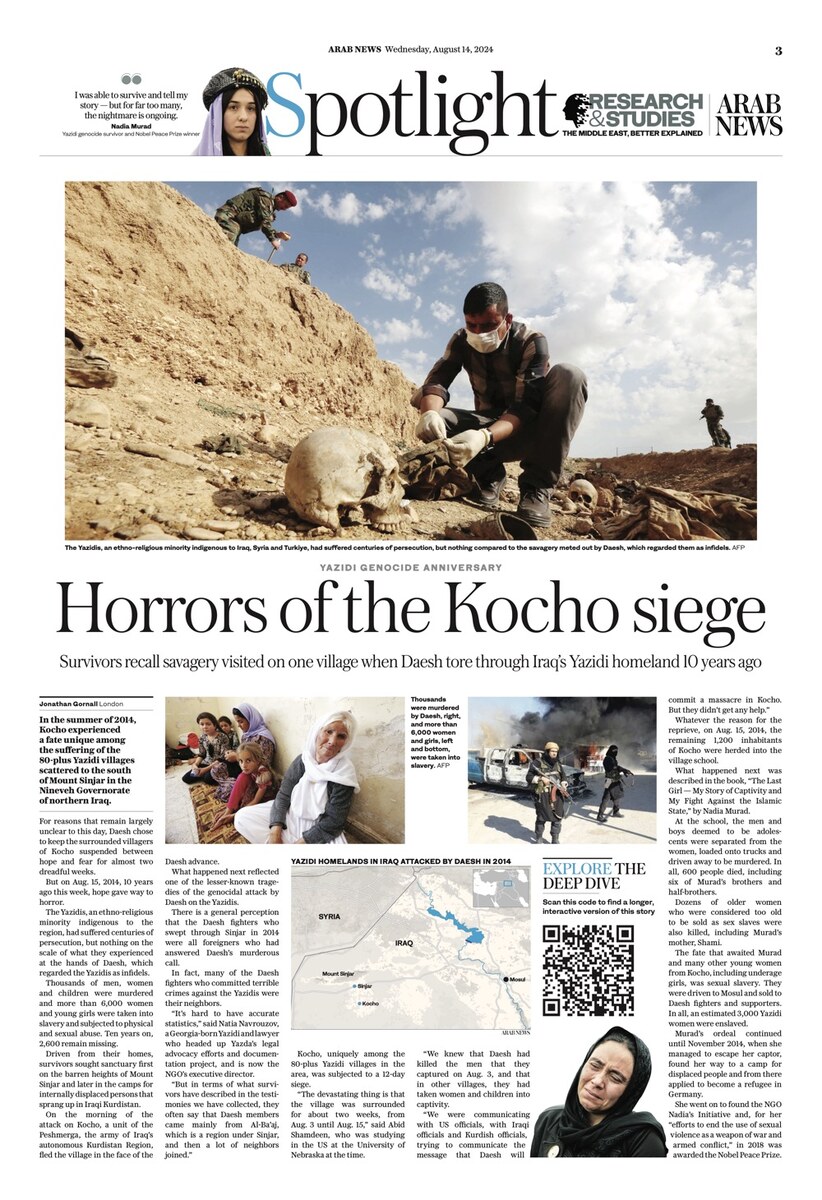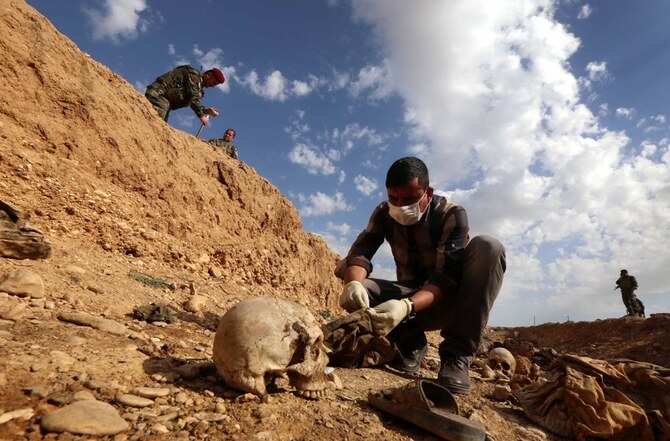LONDON: For 12 days in August 2014, the lives of the inhabitants of the Yazidi village of Kocho hung in a fearful balance.
In the early hours of Aug. 3, Daesh fighters had swept west from Mosul, attacking the town of Sinjar and the dozens of Yazidi villages scattered to the south of Mount Sinjar in the Nineveh Governorate of northern Iraq.
The approximately 1,200 residents of Kocho were woken at about 2 a.m. by the sound of gunfire coming from surrounding villages. At any moment, they feared, their turn would come.
It would, indeed, come, and in the most brutal fashion. But Kocho would experience a fate unique among the suffering of the 80-plus Yazidi villages in the region.

Ten years on from the massacres, 200,000 Yazidis remain in those camps, refugees in their own country, unable or afraid to return to their ruined homes.
For reasons that remain largely unclear to this day, Daesh commanders chose to keep the surrounded villagers of Kocho suspended between hope and fear for almost two dreadful weeks.
And on Aug. 15, 2014, 10 years ago this week, hope gave way to horror.
The Yazidis, an ethno-religious minority indigenous to northern Iraq and parts of Syria and Turkiye, had suffered centuries of persecution, but nothing on the scale of what they were about to experience.
The leadership of the so-called caliphate that had been proclaimed two months earlier by Abu Bakr Al-Baghdadi regarded the Yazidis as infidels, and in August 2014, their objective was nothing less than genocide.
Thousands of men, women and children would be murdered, their bodies thrown into dozens of hastily dug mass graves scattered across a wide area.
More than 6,000 women and young girls were taken into slavery and subjected to physical and sexual abuse. Ten years on, 2,600 remain missing.
Driven from their homes, survivors sought sanctuary first on the barren heights of Mount Sinjar, where many young children would die from dehydration, and later in the camps for internally displaced persons that sprang up in Iraqi Kurdistan.
Ten years on from the massacres, 200,000 Yazidis remain in those camps, refugees in their own country, unable or afraid to return to their ruined homes.
But in Kocho, a small village 15 km south of Sinjar, things were different — at first.

Daesh fighters attacked the town of Sinjar and the dozens of Yazidi villages scattered to the south of Mount Sinjar in the Nineveh Governorate, Iraq. (AFP)
On the morning of the attack, a unit of the Peshmerga, the army of Iraq’s autonomous Kurdistan Region that was stationed in the village school, fled the village in the face of the Daesh advance. It was a similar story across Sinjar.
A couple hundred residents of Kocho left at the same time as their supposed defenders, hoping to reach the relative safety of Mount Sinjar to the north. Some made it. Others were captured en route.
What happened next reflected one of the lesser-known tragedies of the genocidal attack by Daesh on the Yazidis.
There is a general perception that the Daesh fighters who swept through Sinjar in 2014 were all foreigners, mainly overseas volunteers who had flocked to Syria in answer to Daesh’s murderous call.
In fact, far from being foreigners, or even strangers, many of the Daesh fighters who would commit such terrible crimes against the Yazidis were their neighbors.
“It’s hard to have accurate statistics,” said Natia Navrouzov, a Georgia-born Yazidi and lawyer who headed up Yazda’s legal advocacy efforts and documentation project, gathering evidence of Daesh crimes, and is now the nongovernmental organization’s executive director.
“But in terms of what survivors have described in the testimonies we have collected, they often say that Daesh members came mainly from Al-Ba’aj, which is a region under Sinjar, and then a lot of neighbors joined.”
The town of Al-Ba’aj is barely 20 km to the southwest of Kocho.

The Yazidis, an ethno-religious minority indigenous to northern Iraq and parts of Syria and Turkiye, had suffered centuries of persecution. (AFP)
Although many of the Daesh attackers wore masks, when Yazda was collecting testimonies, “survivors were able to identify them really clearly by name, based on their tribes and on their dialects, because the accent they were speaking with was clearly from a certain tribe or village in Sinjar.
“When it comes to foreign fighters, they were mainly present in Raqqa in Syria, and the Daesh attacks on Yazidis in Sinjar in the first days were really locally led.”
Many of the Yazidis also had economic and social relations with the neighbors who turned against them.
“We have testimonies of survivors who say that even before Aug. 3, they already felt some movement from these neighbors, who were looting their belongings or were watching them.
“Some neighbors even called some of the Yazidi people they knew and liked to tell them, ‘You should go because something’s going to happen.’ But I think the Yazidis just didn’t realize that it would be a genocide; they just thought something political was happening.”
The worst betrayal came at the hands of people who had been intimately involved with Yazidi families.

More than 6,000 women and young girls were taken into slavery and subjected to physical and sexual abuse. (AFP)
“There were social connections,” said Navrouzov. “For example, when a Yazidi child is born, they get an equivalent of the Western godfather, called a ‘kreef.’ The kreef is often an Arab. A lot of Yazidis had these almost family connections with their neighbors, and yet even those people attacked them.”
It should not, said Navrouzov, have come as a great surprise, “because in the past, we have often been attacked by our neighbors,” motivated by enduring misconceptions about the faith of the Yazidis, including that they are devil worshippers — a lie exploited by Daesh propaganda.
Yet even now, “10 years after the genocide, and with all this documentation we have gathered and the advocacy work we and others have done, a lot of people in Iraqi society still think that we are exaggerating, that Daesh did not commit the crimes that we are describing.”
Worse than such denial, “some people still think that what Daesh did was right because the ideology behind it is so deeply rooted in the society.”

Thousands of Iraqis flee from the town of Sinjar. (AFP)
According to some reports, the leader of the Daesh attack on Kocho may have been a local man, initially hesitant to carry out the orders from above. Others think local kreefs may have intervened to try to have the village spared.
Either way, Kocho, uniquely among the 80-plus Yazidi villages in the area that were simply overrun, was subjected to a 12-day siege.
“The devastating thing is that the village was surrounded for about two weeks, from Aug. 3 until Aug. 15,” said Abid Shamdeen, who was studying in the US at the University of Nebraska at the time and helped to mobilize support among the Yazidi diaspora.
“We knew that Daesh had killed the men that they captured on Aug. 3, and that in other villages, they had taken women and children into captivity.
“We were communicating with US officials, with Iraqi officials and Kurdish officials, trying to communicate the message that Daesh will commit a massacre in Kocho. But they didn’t get any help.”
Daesh had first entered the village, delivering its usual ultimatum — convert to Islam or die — on Aug. 3. But over the next 12 days, the Daesh commander, “Abu Hamza,” sat down for a series of negotiations with village leaders, including headman Sheikh Ahmed Jasso.
Whatever the reason for the 12 days of reprieve, on Aug. 15, 2014, the talking ended and the remaining 1,200 inhabitants of Kocho were herded into the village school.
What happened next was described in distressing detail in the book, “The Last Girl — My Story of Captivity and My Fight Against the Islamic State,” by Nadia Murad.
At the school, the men and boys deemed to be adolescents were separated from the women, loaded onto trucks and driven away to be murdered. In all, 600 people died, including six of Murad’s brothers and half-brothers. The women in the school could hear the gunshots that killed their sons, brothers and husbands.
Dozens of older women who were considered too old to be sold as sex slaves were also killed, including Murad’s mother, Shami.

A Yazidi child refugee at Delal Refugee Camp in Zakho. (Getty Images)
The fate that awaited Murad and many other young women from Kocho, including underage girls, was sexual slavery. They were driven to Mosul and sold to Daesh fighters and supporters. In all, an estimated 3,000 Yazidi women were enslaved.
Murad’s ordeal continued until November 2014, when she managed to escape her captor, found her way to a camp for displaced people and from there applied successfully to become a refugee in Germany, where she arrived in 2014.
She went on to found the NGO Nadia’s Initiative and, for her “efforts to end the use of sexual violence as a weapon of war and armed conflict,” in 2018 was awarded the Nobel Peace Prize.
The dreadful story of the genocidal Daesh attack on the Yazidis, the battle for justice and the search for the missing that continues a decade later, is told in an Arab News Minority Report, published online here.



























